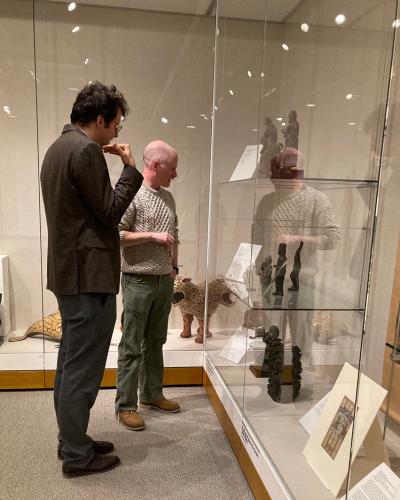In this new series, we highlight former Fellows’ monographs that grew out of their residency projects at the . Our sixth iteration of the Fellows' Q&A series features associate professor of philosophy at Cornell and 2018-19 "Authority" Faculty Fellow, Kate Manne. Her new book, Entitled, was released this week from Penguin Random House.
Big Picture
In my first book, Down Girl, I argued that misogyny should be defined as the “law enforcement” branch of patriarchy—as the system that functions to police and punish women who don’t conform to patriarchal norms and expectations, in a nutshell. That immediately raises the question, what are these patriarchal norms and expectations, particularly in supposedly egalitarian contexts like the US today?
My answer forms the basis of my second book, Entitled: I hold that men are deemed entitled to various desirable human goods—sex, love, care, admiration, power, and claims to knowledge, among other things—and women are deemed obligated to provide designated, typically more privileged men with these goods. This leads to grossly unjust, perverse, and sometimes bizarre outcomes, which the book tries to catalogue, from mansplaining to inequities in the health care system.
entitled.jpeg
Alt Text
ladder leaning against a wall, book coverI also pursue these questions in a resolutely intersectional way, showing how Black, trans, and poor women (among others) are placed at unique disadvantages in a system designed to privilege white, wealthy, cis, heterosexual men above everyone else.
In Particular
I begin with the Kavanaugh hearings, and show how Kavanaugh’s potent sense of entitlement to not only a position on the Supreme Court—one of the positions of the highest moral authority in the land—but not to be questioned, despite the highly credible sexual assault allegations against him, underlay his anger and extreme petulance during the hearings. I also look at the interaction between such entitlement and what I call “himpathy” expressed on his behalf by people like Donald Trump and Lindsey Graham—the undue or disproportionate sympathy often extended to privileged men over their female victims, in cases of sexual assault, intimate partner violence, and other misogynistic behavior.
Following on from that introductory chapter, I examine several interrelated topics that are meant to crystallize male entitlement and how it works systemically as concerns sex and intimacy. One such is the phenomenon of incels: so-called “involuntary celibates,” young men who feel entitled to sex, but even more so to the admiration from a woman which they believe sex with her would give them.
I also canvass the ways in which rape typically goes uninvestigated and unpunished within the American criminal justice system. And I then argue that it’s not just rape and other forms of sexual assault that we need to be concerned about, as feminists: although consent is obviously necessary for ethically good sex, it’s by no means sufficient. For, within a patriarchal setting, women are often deemed obligated to give men the sex to which they’re deemed entitled. Her consent may thus be a performance designed to satisfy a coercive social script, rather than given out of genuine desire (which I regard as the appropriate ethical standard, at least in general). This was the case in “Cat Person,” the short story that went viral late in 2017, I argue.
Discovery
We need to think through ways to undo the pernicious socialization which says that boys and men are differentially entitled to sex, consent, power, care, and so on...
It may sound naïve, but I was surprised and shocked to learn that between one quarter and one third of sexual assault in the US is committed by juvenile offenders (who are overwhelmingly male, just as with older perpetrators). Evidently the sense of entitlement to sex and to exert bodily control over other people (typically, though by no means exclusively, girls and women) can start alarmingly early on in life. Our ageist image of a “creepy old man” as the prototypical rapist may obscure from us the fact that much younger men are engaging in this violence too—and that, as the research I looked at showed, men who rape typically start young (at age 16, on average, according to self-report measures).
This is just one of the reasons why I believe that education is key to combatting many of the problems I canvass. We need to think through ways to undo the pernicious socialization which says that boys and men are differentially entitled to sex, consent, power, care, and so on, and that girls and women owe these goods to boys and men—and that he may seize them forcibly if she doesn’t give them to him freely.
Fellowship
I had a wonderful year where I was able to get much of the writing for this book well underway. And, as I often joke, I’m mildly obsessed with authority in all of its forms—genuine moral authority, which consists in valid moral obligations and entitlements, and the false or pseudo-obligations and entitlements that I’m canvassing in Entitled. I can’t think of a better research environment than the Society that year in which to pursue these questions, surrounded by other scholars thinking through the multi-faceted and diverse (modern and historical) forms that authority comes in.






